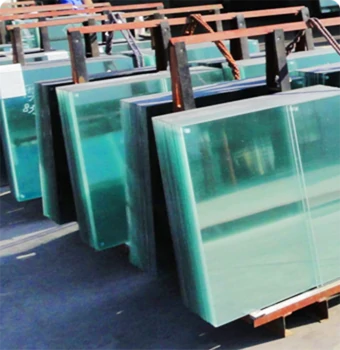Understanding 2mm Float Glass Properties, Applications, and Benefits
Float glass, a widely used type of glass in architecture and manufacturing, is created through a unique process that involves floating molten glass on molten tin. The result is a smooth, flat surface that is ideal for various applications. One specific variant is 2mm float glass, which has become increasingly popular due to its lightweight characteristics and versatility.
Properties of 2mm Float Glass
The standard thickness of float glass varies, and 2mm is considered one of the thinner options available. This thinness lends itself to a variety of properties
1. Transparency 2mm float glass is highly transparent. It allows for maximum light transmission, making it an excellent choice for applications where natural light is desired.
2. Flatness The floating process results in a flat glass surface, which is essential for aesthetic and functional purposes, ensuring even light distribution and minimizing distortion.
3. Versatility 2mm float glass can be easily cut, shaped, and processed to fit different design requirements. It can be laminated or coated to enhance performance.
4. Weight Due to its low thickness, 2mm float glass is lightweight, making it easier to transport and install compared to thicker glass variants.
Applications of 2mm Float Glass
The applications of 2mm float glass are diverse, highlighting its versatility
1. Windows Often used in residential and commercial buildings, 2mm float glass is ideal for windowpanes, allowing ample sunlight while providing a clear view.
2mm float glass
2. Displays and Cases Retail environments frequently utilize 2mm float glass in display cases to showcase products while ensuring they are protected yet visible.
3. Partitions In interior design, 2mm float glass can serve as room dividers, creating an open atmosphere without compromising on space.
4. Automotive This glass thickness is also used in certain automotive applications, particularly for side windows and interior panels, where weight reduction is critical.
Benefits of Using 2mm Float Glass
Choosing 2mm float glass offers multiple benefits, making it a favored option in various industries
1. Cost-Effectiveness Thinner glass options generally come at a lower cost, providing an economical solution for many applications.
2. Aesthetic Appeal The clarity and smooth finish of 2mm float glass enhance the visual appeal of any setting, making it a popular choice among architects and designers.
3. Customization With the ability to be cut to size and treated, 2mm float glass can be customized to meet specific needs, offering flexibility in design.
4. Energy Efficiency In construction, incorporating 2mm float glass into windows can contribute to energy efficiency by maximizing natural light while minimizing the need for artificial lighting.
Conclusion
In summary, 2mm float glass is a practical and versatile material that finds use in a myriad of applications ranging from architecture to retail displays and automotive design. Its properties, including transparency, flatness, and lightweight nature, make it an ideal choice for projects where both aesthetic and functional considerations are paramount. As industries continue to seek innovative solutions, 2mm float glass stands out as a reliable option that combines efficiency, cost-effectiveness, and beauty.
 Afrikaans
Afrikaans  Albanian
Albanian  Amharic
Amharic  Arabic
Arabic  Armenian
Armenian  Azerbaijani
Azerbaijani  Basque
Basque  Belarusian
Belarusian  Bengali
Bengali  Bosnian
Bosnian  Bulgarian
Bulgarian  Catalan
Catalan  Cebuano
Cebuano  Corsican
Corsican  Croatian
Croatian  Czech
Czech  Danish
Danish  Dutch
Dutch  English
English  Esperanto
Esperanto  Estonian
Estonian  Finnish
Finnish  French
French  Frisian
Frisian  Galician
Galician  Georgian
Georgian  German
German  Greek
Greek  Gujarati
Gujarati  Haitian Creole
Haitian Creole  hausa
hausa  hawaiian
hawaiian  Hebrew
Hebrew  Hindi
Hindi  Miao
Miao  Hungarian
Hungarian  Icelandic
Icelandic  igbo
igbo  Indonesian
Indonesian  irish
irish  Italian
Italian  Japanese
Japanese  Javanese
Javanese  Kannada
Kannada  kazakh
kazakh  Khmer
Khmer  Rwandese
Rwandese  Korean
Korean  Kurdish
Kurdish  Kyrgyz
Kyrgyz  Lao
Lao  Latin
Latin  Latvian
Latvian  Lithuanian
Lithuanian  Luxembourgish
Luxembourgish  Macedonian
Macedonian  Malgashi
Malgashi  Malay
Malay  Malayalam
Malayalam  Maltese
Maltese  Maori
Maori  Marathi
Marathi  Mongolian
Mongolian  Myanmar
Myanmar  Nepali
Nepali  Norwegian
Norwegian  Norwegian
Norwegian  Occitan
Occitan  Pashto
Pashto  Persian
Persian  Polish
Polish  Portuguese
Portuguese  Punjabi
Punjabi  Romanian
Romanian  Russian
Russian  Samoan
Samoan  Scottish Gaelic
Scottish Gaelic  Serbian
Serbian  Sesotho
Sesotho  Shona
Shona  Sindhi
Sindhi  Sinhala
Sinhala  Slovak
Slovak  Slovenian
Slovenian  Somali
Somali  Spanish
Spanish  Sundanese
Sundanese  Swahili
Swahili  Swedish
Swedish  Tagalog
Tagalog  Tajik
Tajik  Tamil
Tamil  Tatar
Tatar  Telugu
Telugu  Thai
Thai  Turkish
Turkish  Turkmen
Turkmen  Ukrainian
Ukrainian  Urdu
Urdu  Uighur
Uighur  Uzbek
Uzbek  Vietnamese
Vietnamese  Welsh
Welsh  Bantu
Bantu  Yiddish
Yiddish  Yoruba
Yoruba  Zulu
Zulu 

